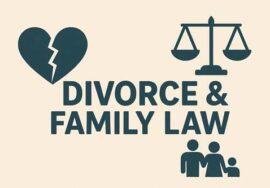Documents for Mutual Divorce
For a mutual divorce in Delhi India, key documents and steps are required to facilitate the process.
Here’s a list of commonly required documents:
Marriage Certificate/ Marriage Card: Proof of marriage, typically issued by the Registrar’s Office, is mandatory for filing for divorce.
Address Proof of Both Parties: This can be a passport, Aadhaar card, Voter ID, utility bills, or other government-issued IDs.
Passport-Size Photographs of Both Parties: Photographs are required from both the parties before filling joint petition.
Marriage Photograph: Marriage photographs are required to prove that you are husband and wife and it is required.
Income Proof (if required): This includes salary slips, bank statements, or Income Tax returns, which may be used to assess financial status for alimony or child support decisions.
Evidence of Separate Living: Any evidence that can show the couple has been living separately for at least one year, such as rent agreements or affidavits.
Jointly Signed Mutual Divorce Petition: It is mandatory to have a mutual divorce petition signed by both parties. It usually includes:
Details of marriage (date, place, etc.)
Reasons for seeking a divorce
Statements of consent for divorce
Terms of settlement (for child custody, alimony, and property division, if applicable)
Settlement Agreement (if applicable): A document detailing terms related to alimony, child custody, and division of assets. Both parties must mutually agree and sign this document.
Affidavits from Both Parties: Declarations regarding the divorce, terms of settlement, and consent to separate.
Steps in the Process of Mutual Divorce
File the Joint Petition: Both parties must file a mutual consent divorce petition under Section 13B of the Hindu Marriage Act or the relevant act applicable to other religions.
First Motion: Both parties appear before the court to confirm their mutual consent.
Cooling-Off Period: The court grants a six-month cooling-off period, after which the second motion can be filed. In certain cases, this period can be waived.
Second Motion: After the cooling-off period, both parties again confirm their decision to divorce.
Final Decree: The court reviews all documents and issues the final decree, formally dissolving the marriage.
Would you need help drafting the mutual consent petition or preparing a settlement agreement?
You may contact us- 07617 414 414
Disclaimer: This article is for educational and informational purposes only. It provides a general understanding of legal remedies but does not constitute legal advice. For specific legal guidance, you can just consult the legal matter expert.




